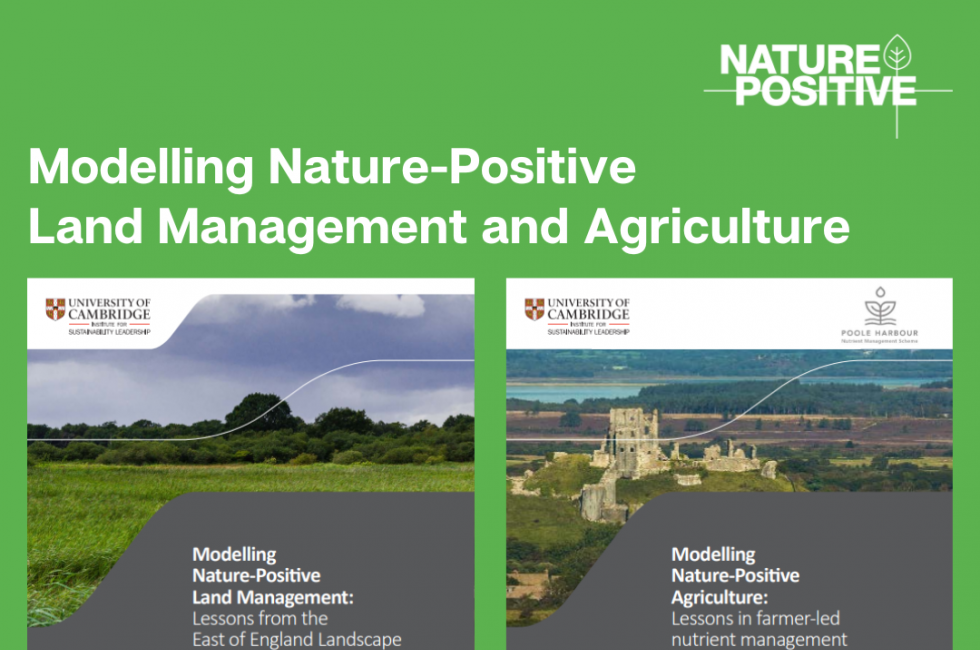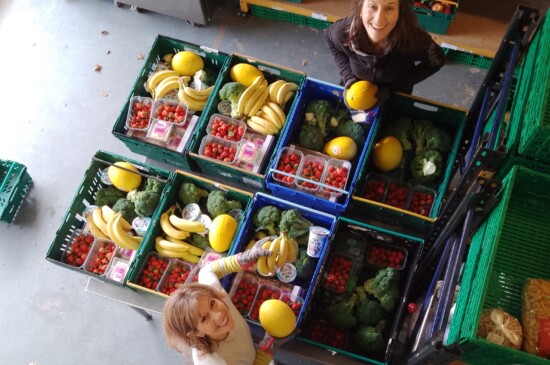
Multisector collaborators deliver scalable land management models to improve water quality
- Countryside
- Environment
Made possible by a major grant from PWCF, the University of Cambridge Institute for Sustainability Leadership (CISL) has published two reports on new regenerative nature projects. The reports offer blueprints for land management that supports a range of environment improvements, including biodiversity, water quality, flood mitigation, emissions reductions and carbon sequestration, through more sustainable agriculture.
Four years after The Catchment Management Declaration was launched by HRH The Prince of Wales, Patron of CISL, two pilot nature-based solutions projectshave brought together farmers, businesses, local authorities, government departments and agencies and NGOs to deliver scalable solutions to reduce land, habitat and water degradation and flood risk.
At the heart of both projects is the need for deep collaboration to effect change within interconnected natural systems that service national economies and global markets without sufficient replenishment. With negative impacts on biodiversity, land and water being accelerated by climate change and pollution, these studies from CISL frame a new collective approach to land management that works alongside nature to improve the natural environment while offering benefits to farmers, utilities, the private sector and public services.
Dr Gemma Cranston, Director, Business and Nature, CISL said:
“We are living in the middle of a climate and biodiversity crisis and need new approaches that work with nature to deliver positive outcomes for multiple stakeholders. These two case studies provide critical learnings for those in the public and private sector to accelerate the uptake of nature-based solutions in partnership with others. The benefits are clear, the challenge is now to take this to scale.”
Case study 1: Modelling nature-positive land management – East of England
Operating across six counties in East Anglia and the Midlands, this project builds on existing schemes that pay farmers for ecosystem services by aggregating supply and demand.
Locally-based organisations interested in more sustainable grain supply and better water quality pooled resources to raise £1m in 2021 to finance improved farm practices. Thirty-one local farmers then bid for funding to take specific in-field or capital investment measures chosen from an agreed list that included planting new hedgerows, introducing autumn cover crops and using nitrogen inhibitors to stem leaching.
Initial funding partners included Anglian Water, Nestlé Cereal Partners UK, Essex and Suffolk Water, Nestle Purina and Northampton County Council. These have since been joined by Affinity Water and Cargill, with £2.4m raised for the second project round launched in spring 2022 with 71 farmers taking part. The scheme’s rapid growth reflected farmer interest and ambition, and the additional partners which enabled a doubling of budget and a 250% increase in scale, covering more than 250,000 hectares. The scheme will continue at least until 2027 and up to 120 farmers are expected in 2023.
It is expected participating farms will deliver a range of ecosystem benefits within a single landscape, splitting costs across multiple partners. Over time, the project, developed by the East of England Landscape Enterprise Network (LENs), aims to generate large-scale, measurable improvements for the region in water quality, flood mitigation, biodiversity, water resources, greenhouse gas emissions reductions, carbon sequestration and regenerative agriculture.
Ruth Burnham Senior Flood and Water Officer, Northamptonshire County Council said:
“The LENs project has allowed us to progress delivery of flood risk management measures in areas that wouldn’t qualify for Grant in Aid, due to the cost of traditional schemes versus numbers of properties affected, by looking at wider benefits and opening up co-funding opportunities. Working in partnership with Anglian Water and the Environment Agency, we have been able to focus on the areas of our highest combined priority, by comparing our various records and understanding of flood history.“
Case study 2: Modelling nature-positive agriculture – Poole Harbour
Set up by and for farmers, the Poole Harbour Nutrient Management Scheme (PHNMS) is supported by regulators, the agricultural sector and local stakeholders. Its goal is to stem the nutrient leaching harming Poole Harbour’s protected coastal habitat and unique wildlife.
To avoid a blanket Water Protection Zone (WPZ) being imposed on local agriculture, participating farmers are changing their practices to reduce leaching levels year on year. To help offset the costs, they can trade the excess nitrates they are allowed to generate under Environment Agency requirements with other regulated stakeholders such as Wessex Water and local developers. Over time, the scheme will include trading among participating farmers across the 820km2 catchment.
Eighteen farming businesses took part in a 2021 trial to test the scheme. Each farm used a nitrate leaching tool to calculate its soil nutrient load and 13 farms with loads below those required by the Environment Agency then sold the surplus to Wessex Water. In future years, such transactions will enable the company to offset its release of nitrates in wastewater, generate significant extra income for farmers and, over time, improve water quality and ecology. The trial’s success has led to a wider pilot with around 40 farms, launched in summer 2022. The goal is to involve most catchment farmers by 2024.
Backed by the NFU and local councils, and managed by Poole Harbour Agriculture Group (PHAG), a farmer collective, PHNMS will be run as an Environment Agency ‘approved scheme’. Whilst its primary goal is to reduce nitrate runoff from farms, it has the potential to deliver co-benefits for sustainable, productive agriculture, biodiversity, and carbon and climate goals.
Nikki Hiorns, Wessex Team manager, Natural England said:
“This scheme is unique and trailblazing in finding new ways to work together to improve water quality and the environment. As regulators, our top priority is that it drives the restoration of Poole Harbour SPA to favourable condition by genuinely reducing nutrient inputs upstream in the catchment. Without farmers and land managers leading this change we won’t solve the problem. […] Not only will delivery of the scheme lead to agricultural nitrate reductions in this catchment, we hope it will lead the way and teach other catchments how we can collectively work together for environmental benefit.”
Annual studies carried out by the Joint Nature Conservation Committee (JNCC) indicate there has been little change in the number of UK surface water bodies awarded high or good ecological status since 2009 – with just 36% being in high or good status in 2020 with this remaining steady over the measured period. Nature-based solutions are currently relatively small-scale but are expected to expand rapidly under new UK Government agriculture and environment policies and targets post-Brexit.
To date more than 110 organisations have signed up to the Catchment Management Declaration which aims to progress commitment and action for a multisector approach to the management of land. It was developed to positively respond to the UK Government’s 25 Year Environment Plan. Support for the Declaration’s six principles has led to the formation of the Catchment Leadership Network (CLN) which aims to drive a step change in the level of activity on catchment management by:
supporting strategic business engagement in catchment management
identifying and addressing barriers, gaps and enablers that will catalyse a sustainable model for catchment management in the UK and Ireland
strengthening institutional capacities and enablers, including financial mechanisms and governance approaches to engage in catchment management
capturing, learning from and applying best practice
cacilitating and showcasing the delivery of exemplar cross-sector catchment management schemes and partnerships.
Nikki Jeffery, Executive Director, The Prince of Wales’s Charitable Fund said:
“The results of the innovative LENs project are impressive and demonstrate the real potential for nature-based solutions. LENs’s approach of facilitating more effective collaboration between farmers and the public and private sectors to achieve shared interests provides a blueprint for scaling up more sustainable land management practices across the country. Stemming nutrient leaching is an important step in protecting water quality, coastal habitats and wildlife. The results of the Pool Harbour project are promising, and we hope that regulators will work closely with farmers to continue this crucial work for years into the future.”
Read the modelling nature-positive agriculture and land management case studies.


